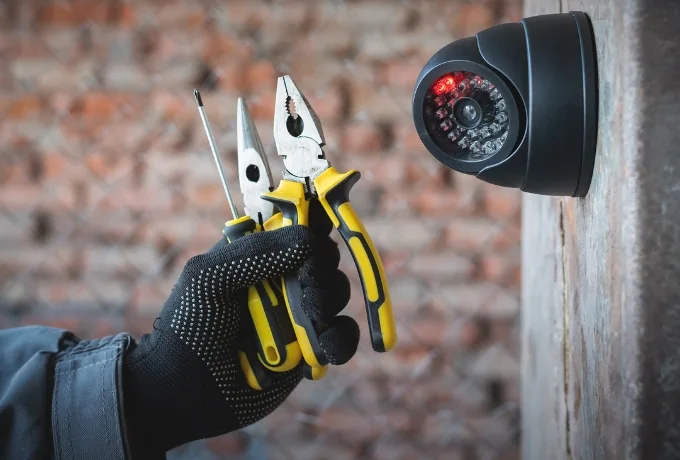Security monitoring has turned into a need rather than an extravagance in the present world. This is very obvious in its job of hindering theft and improving well-being inside areas. In any case, if you plan to have safety cameras mounted in Los Angeles, you ought to know what the guideline requires. Failure to do so may attract penalties and lawsuits following city and state laws to the latter; hence, the footage may never be admissible in court. FDS takes pride in keeping homeowners as well as business investments safe, legally, and efficiently. Here’s a heads-up.
Rules for Getting a License to Install CCTV
It is considered a regulated trade to have surveillance cameras in Los Angeles and all over California. To be able to do such work legally, the California Contractors State License Board (CSLB) mandates that any person or company putting in these low-voltage systems, including CCTV, must carry the C-7 Low Voltage Systems Contractor License. On the other hand, there are instances where the C-28 Lock and Security Equipment Contractor License may be applicable, particularly if you are installing intercoms or electronic access control. Technicians at CCTV Camera Installation FDS are all fully licensed and insured, making every client compliant and comfortable.
Privacy Laws in California
Perhaps one of the most essential legal fields that must be understood is that of privacy law. California runs under strict codes and statutes to ensure the practice of protection against unauthorized surveillance.
➤ No Recording in Private Spaces
It is illegal to place security cameras in locations where people feel they want to have privacy. This includes:
- Bathrooms
- Bedrooms
- Locker rooms
- Changing areas
- Private offices (without notice)
This rule applies to both residential and commercial properties. Violating this law could result in civil or even criminal charges.
Public Areas Are Generally Allowed
You are generally allowed to record video in public-facing areas, such as:
- Driveways
- Front yards
- Entrances
- Parking lots
- Hallways (in multi-unit buildings)
- However, even outdoor cameras should not point directly into a neighbor’s window or property.
Audio Surveillance: Two-Party Consent Required
Video does not face as many restrictions, but audio recording is heavily restricted in California. This falls under the two-party consent state governed by Penal Code 632, that is to say, all parties need to be informed and give their consent to be recorded. If your CCTV system has microphones or picks up sound, then you have to
- Have clear documented consent from all parties being recorded, or just turn off audio recording all.
- At CCTV Camera Installation FDS, we make sure that all systems with audio comply with these legal standards.
Signage Requirements and Notifications
Whereas under California law, signage is not always a requirement, it is highly advisable to put up clear signs that state, “Security Cameras Are in Use.” Areas include, but are not limited to,
- commercial buildings,
- apartment complexes,
- common area,
- and parking garages.
In some industries, retail or firearm sales, failure to post the mandatory signage can result in a regulatory violation; it puts you on solid legal ground and also acts as a deterrent against would-be wrongdoers.
HOA and Permit Requirements in Los Angeles
Rules vary in different parts of Los Angeles. For example, the actual City of Los Angeles doesn’t usually demand permits for the majority of residential home CCTV systems. However, some cities within Los Angeles County do, such as Norwalk, Inglewood, or El Monte, and specifically an installation permit is needed for outdoor cameras that can be seen. It is likely that it will require written permission to install outdoor cameras if you are living in an HOA-controlled community. Often, HOAs impose restrictions on the position of the cameras and even their design and design plan. CCTV Camera Installation FDS therefore closely consults its clients to ensure conformity with local by-laws and HOA directives.
Data Storage and California Privacy Laws
The evolution of privacy laws in California came with the emergence of intelligent cameras and cloud video storage. Under CCPA and CPRA, businesses are obligated to notify individuals if their footage is being recorded and stored. Enable access or deletion of their data upon request (for certain use cases)
Keep footage safe to stop data leaks. Home users often do not fall under CCPA, but firms must follow it, mainly when handling client or worker monitoring.
Legal Use of CCTV Footage
To use CCTV footage in court, it must be collected legally and ethically:
- No footage from private areas without consent
- No illegal audio recordings
- No tampering or editing of evidence
- Footage must be time-stamped and securely stored
Final Thoughts
Understanding the legal requirements for CCTV is as important as naming the best camera system. From licensing to privacy laws, signage to HOA approval, get one wrong, and your investment could endanger rather than protect you. That’s why at CCTV Camera Installation FDS, we bring legal know-how together with technical prowess for surveillance solutions that work and stick within the rules.
FAQs:
Question: Do I need a license to install CCTV in Los Angeles?
Answer: Yes, a C-7 or C-28 contractor license is required for CCTV installation in Los Angeles.
Question: Can I legally record video on my property?
Answer: Yes, you can record a video of every corner of your property, but in public areas, no recording in private spaces like bathrooms or bedrooms.
Question: Is audio recording allowed with CCTV in California?
Answer: Only with consent from all parties, otherwise not allowed to record audio, because California is a two-party consent state.,
Question: Do I need to post signs for my security cameras?
Answer: For legal protection, yes, but not always required.
Question: Are permits or HOA approval required before CCTV installations in Los Angeles?
Answer: Possibly, the HOA approval is required for CCTV installation in Los Angeles.

